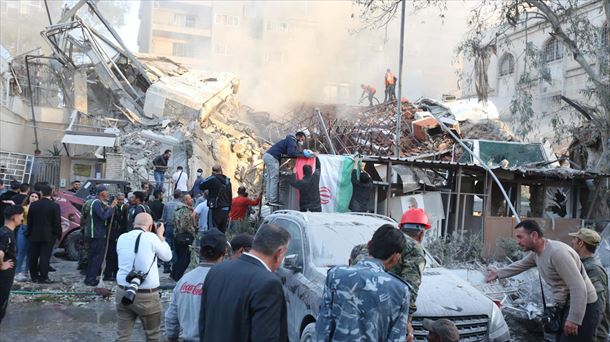Kiev believes Moscow is seeking the participation of one of its last allies in the major offensive it is preparing for next month.
Belarusian President Alexander Lukashenko has traveled to Russia seven times in 2022 to meet his Russian counterpart, Vladimir Putin. However, Putin had not visited Belarus in three years, since 2019. He had to do so this Monday to try again to convince Lukashenko to get more involved in the war against Ukraine, something Minsk has been trying to avoid since the conflict broke out . The truth is that the head of the Kremlin has not met another foreign leader as often as he, one of his few remaining allies.
Both leaders then only saw each other in the presence of their respective delegations, where Lukashenko stated that “Russia and Belarus find answers to all threats despite some harshness”. In his words, Belarus “hopes that the West will listen to the voice of reason and resume security dialogue”.
The Belarusian president explained that his meeting with Putin was due to “the impossibility of the respective governments to solve a series of problems”, although he emphasized that thanks to joint work, the two countries “have managed to overcome the possible negative consequences of pressure” of “Western” sanctions. He stressed that “the resolution of sensitive economic issues to ensure the well-being of the population is a priority” for Russia and Belarus.
Putin took the same line, also describing the economic relationship with Belarus, against whom the United States and the European Union have applied different sets of sanctions, as a “priority”. The Russian top leader said he expects a new record in commercial sales this year, which his figures say will be close to 40,000 million euros. “We should be satisfied with how our cooperation is developing (…) Belarus is our ally in the broad sense of the word,” Putin said. Later, during the press conference, the Russian president assured that his country has no plans to annex Belarus, saying, “there is no interest in taking anyone in. It just makes no sense.”
Although the two presidents tried to emphasize the economic aspect of this new meeting, the truth is that the real content of the talks, especially those conducted face-to-face without the presence of advisers and ministers, was military cooperation. Lukashenko acknowledged this when he pointed out that “the issues that have concerned us most recently have been those of defense and security” and especially “Russia’s commitment” to protecting the “independence of Belarus” against possible NATO to attack. Instead of sitting across from each other, as is customary at bilateral state meetings, they did so together, something which, according to Belarusian media, “emphasizes the friendly and close-knit nature of the relationship”.
However, according to Ukrainian general Sergiy Náyev, the real purpose of Putin’s trip to Minsk was “to involve the armed forces of Belarus more broadly in the war against Ukraine (…) to achieve even their participation in the war.” land of invasion.” Last week, Ukrainian President, Volodimir Zelensky, his Defense Minister, Oleksii Reznikov, and several Ukrainian army generals warned that Russian troops are preparing a major offensive for January with the intention of attacking Kiev from Belarusian territory.
On Friday, Putin convened his Security Council and called for more “interaction” with Belarus on defense matters. On the same day, the Russian President met with the military command to order measures to speed up military operations in Ukraine. Just today in Minsk, the Russian and Belarusian defense ministers, Sergei Shoigu and Victor Jrenin, took part in the talks. The first inspected the Russian units participating in the invasion over the weekend.
The meeting between Putin and Lukashenko has, according to German Chancellor spokesman Steffen Gebeshtreit, raised concerns in the German government in statements to the DW. Due to the “question of possible further modification of Belarus’ role in Russia’s aggressive war against Ukraine”. So far, Minsk has helped Russia in the fighting by providing Russian troops with its territory for deployment and its airspace for Moscow’s fighter jets.
The Russian Defense Ministry announced on Monday that its army will conduct new tactical exercises in Belarus. “The final characterization of the capability and combat readiness of the joint units will be given by the command in the final coordination phase, after the tactical exercises have been carried out,” the military statement said. The text ensures that the training is carried out “day and night”, so that the degree of coordination of both armies is “high”.
The promoter of the unclear union of Russia and Belarus was Lukashenko, but he later corrected and turned his back on Moscow. The current Belarusian president and Putin’s predecessor, Boris Yeltsin, signed the agreement for the establishment of a unitary state in the Kremlin on December 8, 1999. It was the fourth document after three previous failed attempts. It provided for the creation of a confederal structure with the same economic and defense policies with a single currency.
But the plan did not come to fruition. There was, yes, some progress. Using the European Union as a reference, they created a common economic space and abolished border and customs controls, which were later reinstated. Now the Kremlin plans to revive the project to give it a more military orientation and strengthen its offensive in Ukraine.
Source: La Verdad
I am an experienced and passionate journalist with a strong track record in news website reporting. I specialize in technology coverage, breaking stories on the latest developments and trends from around the world. Working for Today Times Live has given me the opportunity to write thought-provoking pieces that have caught the attention of many readers.



